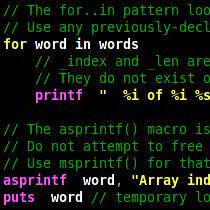Discover and explore top open-source AI tools and projects—updated daily.
voicechat2 by  lhl
lhl
Local AI voicechat using WebSockets
Top 46.0% on SourcePulse
This project provides a fast, fully local AI voice chat system using WebSockets, targeting users who want to build or experiment with real-time, conversational AI agents. It offers modularity for Speech-to-Text (SRT), Large Language Model (LLM), and Text-to-Speech (TTS) components, enabling customizable voice chat experiences with low latency.
How It Works
The system employs a modular architecture, allowing users to swap out SRT, LLM, and TTS backends. It utilizes WebSockets for communication, enabling simple remote access. Key components include Voice Activity Detection (VAD) via ricky0123/vad and Opus audio support via symblai/opus-encdec. The modularity allows integration with various popular libraries like whisper.cpp, faster-whisper, llama.cpp, Coqui TTS, StyleTTS2, and Piper.
Quick Start & Requirements
- Install: Clone the repository, create a Python 3.11 environment (recommended: mamba), install requirements (
pip install -r requirements.txt), and buildllama.cppwith ROCm (GGML_HIPBLAS=1) or CUDA (GGML_CUDA=1) support. - Prerequisites: Ubuntu LTS, ROCm or CUDA setup, Python 3.11,
byobu,curl,wget,espeak-ng,ffmpeg,libopus0,libopus-dev. - Models: Requires downloading GGUF models for LLMs (e.g.,
Meta-Llama-3-8B-Instruct-Q4_K_M.gguf). - Resources: Latency can be around 1 second on AMD RDNA3 (7900-class) and as low as 300ms on an RTX 4090 with specific models.
- Links: voicechat2 demo video (unmute to hear audio), Hackster.io writeup
Highlighted Details
- Achieves sub-second latency for voice-to-voice conversations on high-end GPUs.
- Supports multiple SRT (whisper.cpp, faster-whisper, HF Transformers), LLM (llama.cpp, OpenAI API), and TTS (Coqui TTS, StyleTTS2, Piper, MeloTTS) backends.
- Includes convenience scripts (
run-voicechat2.sh,remote-tunnel.sh,local-tunnel.sh) for deployment and remote access.
Maintenance & Community
The project is maintained by lhl. No specific community channels (Discord/Slack) or roadmap are explicitly mentioned in the README.
Licensing & Compatibility
The README does not explicitly state a license for the voicechat2 repository itself. However, it references other projects with MIT and Apache 2.0 licenses. Compatibility for commercial use or closed-source linking is not specified.
Limitations & Caveats
Installation instructions are specific to Ubuntu LTS and assume prior ROCm/CUDA setup. The project does not specify a license, which may impact commercial adoption. Some referenced related projects have unclear or missing licenses.
1 year ago
Inactive

 themanyone
themanyone GRVYDEV
GRVYDEV gtreshchev
gtreshchev KoljaB
KoljaB ILikeAI
ILikeAI uezo
uezo sindresorhus
sindresorhus chengsokdara
chengsokdara alesaccoia
alesaccoia lenML
lenML bolna-ai
bolna-ai QuentinFuxa
QuentinFuxa